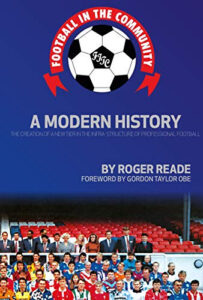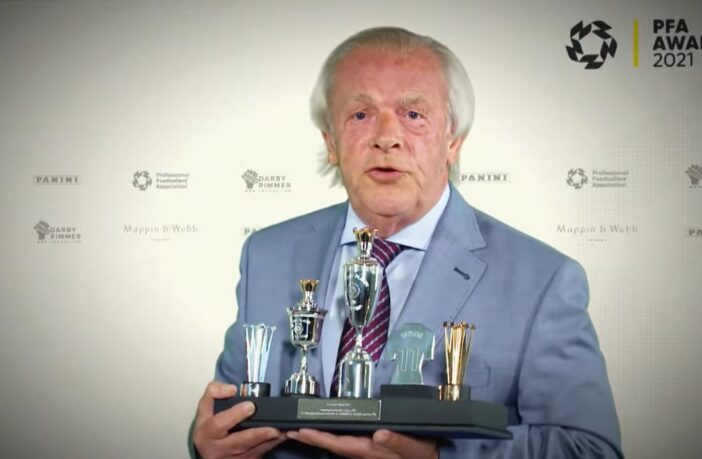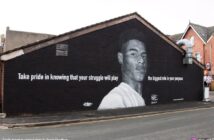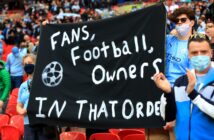35 JAAR VOETBALLEN VOOR EN MET DE SAMENLEVING – GORDON TAYLOR
Geen beter moment om het even over de beste kant van het Engels voetbal te hebben. Deze week staat met de halve finales en de finale de Europese voetbalfocus volledig op het elftal van Gareth Southgate en op Wembley.
Soms verandert een ontmoeting een mensenleven. Dat overkwam mij rond het jaar 2001. Toen leerde ik Roger Reade kennen, sinds 1986 aan het hoofd van Het Football in The Community Programme (FITC). Dat vierde vorig jaar zijn 35ste verjaardag (1985-2020) . Het ontstond als reactie op het hooliganisme en in de nasleep van het Heizeldrama. Intussen is het één van de sterkste positieve maatschappelijke invloeden van Groot-Brittannië geworden en verdient het uitbreiding naar alle landen van Europa.
Roger Reade schreef er een fascinerend boek over: Football in the Community. A modern history. The creation of a new tier in the infrastructure of professional football. (Empire Publications 2021, 325 pag.)
Gordon Taylor is voorzitter van de spelersvakbond Professional Footballer’s Association (PFA) en schreef de inleiding tot het boek. Die publiceren we met zijn toestemming integraal op ons platform.
In het kader van de zestigste verjaardag van het Europees Landenkampioenschap (1960-2021) zou de UEFA dit bij alle voetbalbonden op de agenda moeten zetten. In afwachting van opvolging verdient het een internationale bekroning.

| Foreword by Gordon Taylor OBE
As I reflect on the last four decades of achievement at the PFA and what the Football in the Community Scheme has meant to so many people from diverse backgrounds, with different ideals, different motivations, and from different cultures, the PFA membership boasts professional players from all over the globe, demonstrating that irrespective of culture, race, creed, religion or politics, we are an open and welcoming country.
Casting my mind back three decades, and when we at the PFA sat down in the middle of the 1980’s and started to talk about where football in England was, and what a battering it was taking, the scene was unremittingly bleak.
I had taken over from Cliff Lloyd as the Chief Executive in 1981 eager to build on so much of the excellent work of the Association in so many ways. The working conditions for players had gradually improved, the maximum wage had been abolished and at the advent of TV coverage in the 1950’s, Cliff had negotiated with the television companies to protect payments to the Union on behalf of the players. We were in a good place, but we knew there were several daunting challenges ahead.
Then the going got really tough. Football was being used for political reasons, extreme groups latched on to it, we experienced pitch invasions, racism, the horrors at a number of stadiums, notably Heysel and Valley Parade at Bradford before the Hillsborough tragedy concluded an appalling decade.
Prime Minister Margaret Thatcher pinned the blame on football and there was talk of identity cards just to get into stadiums; Sir Bert Millichip and Ted Croker, the Chairman and Secretary of the Football Association, insisted it was a societal problem and it seemed impossible to resolve the differences between politicians and the football authorities.
We at the PFA felt we had to take the initiative. We said there was no use playing a blame game and that if football was our major spectator and participant sport, then it was clearly a vital part of our social fabric and we needed to use it for the greater good. Some threw up their hands and said “there’s nothing you can do about it, it’s just the way society is”.
If we had done nothing, there was every chance the game could have died on its feet. We got all the staff together – Mickey Burns, our Education Officer, to the fore – and discussed how we could make football a force for good. We decided that, by asking our members to agree to a clause in their contracts to work a few hours a week on community work, they would be showing an enormous degree of social responsibility. They would go into the schools and the rundown areas around our grounds, where so many homes were boarded up, and preach a gospel of better behaviour, how important it was that people were involved with their local football club, to extol equality schemes and diversity, discuss crime in inner cities, talk about the benefits of sport for health reasons, promote the virtues of education if kids were playing truant, and teach them about their local club and the history of the game. People looked at us – frowned may be a better description – and wondered if we could ever change it.
We said we’d try a pilot scheme in the North West, at six clubs, Manchester United, Manchester City, Oldham Athletic, Preston North End, Bury and, my old club, Bolton Wanderers, providing jobs for ex-players. What was looked at very dubiously in its initial period, then extended and extended and is now not only established in this country but also sets a great example to the rest of the world extolling football’s contribution to social responsibility.
There has been a massive change in the intervening years to the extent that it is one of the major reasons why football, instead of dying on its feet, regained its popularity attracting people who had never been before, more women, youngsters, family stands, all-seater stadia, it was the game to be at.
I like to think from that particular acorn a lot of oak trees have grown and football set that in motion and set the standard. We have conferences here at the PFA where countries from around the world come to wish to know what we do and what effect it has.
Several images spring to mind. I particularly remember talking to local police officers who said what a difference it was making to their job to see the football club embracing the community and having players going out and speaking against knife crime and hooliganism and the letters we had by the dozen from schools saying how good it was players could come out to their schools and get the message across. The teachers would simply not have had the same impact.
There was the time I visited a centre in Liverpool where disabled youngsters were playing our game at a community function. One of the parents approached me and said I had no idea what a difference had been made to the quality of life of her son and herself because unless he was playing with other handicapped children, he felt so disadvantaged, that the level we had found was perfect, her son so loved the interaction with players and it gave her such peace of mind that she was able to bring him to these sessions and talk to other parents of disabled children and share their stories.
We also funded a programme for young offenders to take coaching courses in Wigan. I went there with Chris Kirkland, Brett Emerton and Kevin Davies representing their respective clubs. It was quite an intimidating atmosphere but the lads did great and I’ll always remember the response of one of the lads in there when he started to coach. I told him who I was, that we helped with the funding, and said we just wanted the lads in here to do well, and for them to be able to engage in something meaningful when they were released. He said: “Mr Taylor, all my life I’ve been told what to do, what to do, what to do. For the first time, I’m running a course and the youngsters are asking ME what to do.” It was as humbling moment.
So, here we are. Thirty plus years down the road. Football in this country is thriving. It is a £7 billion dollar industry worldwide, thanks to the remarkable success of the Premier League, the bolstering of the English Football League and the fact we have a Conference in which over half the players are full-time. People who once ran scared of football, now need to be there. The change has been phenomenal. But we do need to remember where it was to truly appreciate where it is now.
There have been a whole lot of issues we have addressed, we have been open and inviting, we have women on our Management Committee, the women’s game is flourishing; we’re getting to the stage where Football League Clubs will introduce an open and fair recruiting system for all of its coaching staff. These are massively important steps forward.
There are still many things in football that aren’t perfect but what we started in the 80’s has had a real and lasting impact, no doubt about it. We don’t sit back, there are always new challenges. And with any cause, the longer it runs, the more you need to keep it fresh. You want to do better and better because these issues need to be addressed in whatever way is appropriate for this digital age.
We are all one football family and if one particular tribe wants to be divisive and only think about itself that will be self-defeating. We know the issues out there, racism, homophobia, anti-Semitism, anti-Islamism and all the gender issues – they haven’t gone away, they’ re always below the surface if you’re not careful but the message from football is more important than ever because our country has assimilated more nationalities than any other country in the world which is to our credit.
Roger Reade has created an impressive and chronological analysis of the development and progression of the national Community Programme over the past thirty years, and we should be enormously proud of the positive influence and contributions made by so many to effect positive change in our society. The book is a tribute to the thousands of people involved in football’s social responsibility programme and to all PFA Community personnel from Mickey Burns at the outset, Roger who took over the reins and John Hudson who has impressively accelerated the programme with his colleagues to its eminent place in football’s culture in this present day.
|




